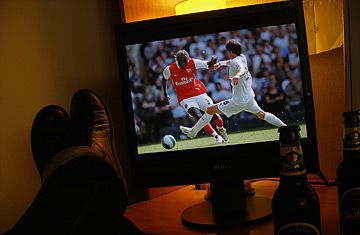
"We never lose to them," says an ashen-faced Samuel Chow, cupping his head in his hands. "We can't..." Over fifty Hong Kongers in replica soccer jerseys bearing such decidedly non-Chinese names as Toure, Van Persie and Fabregas slump dejectedly. At the other end of the satellite feed that has them transfixed, their beloved Arsenal Football Club has just gone a goal down to its hated North London neighbor, Tottenham Hotspur. It's a fixture Arsenal has not lost in nearly eight years, but as shots fly wide or hit the goal posts, the nervous murmur around this packed bar suggests that some are contemplating the unthinkable.
Not too long ago, it would have been hard to imagine that a North London neighborhood rivalry would even be known, much less embraced, by people seven time zones away. But, buoyed by a massive inflow of cash from TV revenues and transnational investors and sponsors, English soccer has became a global brand, keeping more than half a billion viewers riveted in bars and living rooms from Tokyo to New York, Beijing and Mumbai to Baghdad and Mogadishu. Today, you're as likely to see an Arsenal replica shirt sported at a Paris café or a Sadr City demonstration as you would on match day in North London.
Teams once rooted in local English neighborhoods have been transformed into global mega corporations with dwindling connection to their origins. Arsenal, coached by a Frenchman, fielded not a single English player in Saturday's game. Its main sponsor is the airline of the United Arab Emirates, and among the shareholders vying for control of its board are a Russian oligarch and an American sports mogul. Britain's working class may once have been the mainstay of the game's fan base, but it has been steadily priced out of stadiums as the game's primary revenue stream has begun shifting towards its hundreds of millions of global fans.
The headed equalizer by Arsenal's Togo striker Emmanuel Adebayor brings the members of Hong Kong's Arsenal Supporters Club to their feet, overturning tables, spilling drinks. Their roar of joy and relief is joined all around the world.
"I love Arsenal. They play so beautifully," gasps Jay Fung, a 32-year-old music store salesman. He has just started supporting the team when, in 1996, new French coach Arsène Wenger introduced a gloriously elegant high-speed attacking style that contrasts sharply with the more rugged game favored by most English clubs. Its entertaining verve and the charisma and youth of Wenger's squad makes Arsenal a natural choice for Asian fans with no roots in the local traditions that shape the preferences of English supporters.
But there's a mysterious alchemy that converts the most fair-weather spectator into a true believer. The Arsenal fans of Hong Kong read the game with the scholarly intensity of their English peers, and they organize trips to Europe to watch their heroes play live — two years ago, Fung made it to an Arsenal European Champion's League match in Prague. Arsenal even gives them a social identity in Hong Kong. "We're like a close group of friends," says Chow, a supporter for three decades.
Perhaps because it's been many years since Tottenham has been in a position to challenge Arsenal's standing among England's top-four teams, few Hong Kong Arsenal fans share their North London cohort's century-old hatred for Spurs. But my brother watched Saturday's game at an Arsenal watering hole in the largely working-class North London neighborhood of Stoke Newington, where belligerent chest-thumping ritual abuse of Tottenham fans was more the order of the day. Even in Stoke Newington, however, there was a new twist: A group of local Nigerian Arsenal fans offered up a ditty in Yoruba, which was eagerly learned and repeated by the ecstatic throng. Just like the team itself, the local fan-base has gone global.
When a screaming volley from Adebayor seals the win, I'm embraced by delirious Hong Kongers, ears tingling with triumph and adrenaline as the raucous crowd sings the name of the Togo striker. Faintly in the background, I can hear the fans in the stadium 6,000 miles away echoing their song.
— With reporting by Kanishk Tharoor/London
